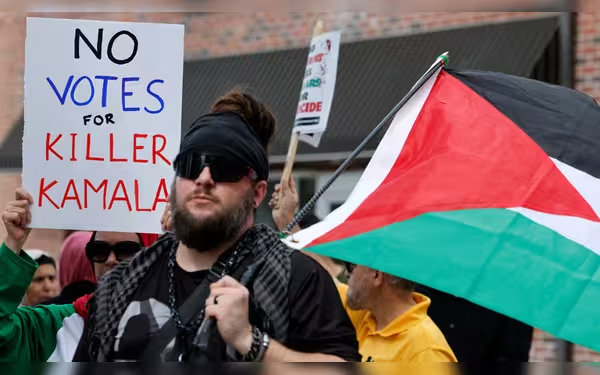Sunday, October 6, 2024 04:31 AM
Harris Engages Arab American Leaders in Michigan Over Israel Conflict
- Harris addresses Arab American concerns in Flint, Michigan.
- Community leaders express frustration over U.S. support for Israel.
- Humanitarian crisis in Gaza and Lebanon highlighted during meeting.
 Image Credits: arabnewspk
Image Credits: arabnewspkVice President Kamala Harris meets Arab American leaders in Michigan to address concerns over U.S. support for Israel amid ongoing conflicts.
In recent weeks, the political landscape in the United States has been significantly influenced by the ongoing conflicts in Gaza and Lebanon. Vice President Kamala Harris has found herself in a challenging position as she seeks to reconnect with Arab American and Muslim voters, a demographic that played a crucial role in the election of President Joe Biden in 2020. This group is now expressing frustration over the U.S. government's support for Israel amid escalating violence in the region.
On a visit to Flint, Michigan, Harris met with leaders from the Arab American and Muslim communities to address their concerns. This meeting was part of her campaign's broader strategy to regain the trust of voters who feel disillusioned by the current administration's foreign policy. Among the attendees were representatives from Emgage Action, a group that recently endorsed Harris, and individuals like Hala Hijazi, who has suffered personal losses due to the conflict in Gaza.
During the meeting, Harris acknowledged the severe humanitarian crisis unfolding in Gaza and Lebanon, where civilian casualties and displacement have reached alarming levels. She emphasized the need for efforts to end the violence and prevent a wider regional conflict. Wa’el Alzayat, the CEO of Emgage Action, articulated the group's disappointment with the U.S. response to the crisis, urging Harris to convey the urgency of a ceasefire to President Biden.
As the political climate heats up, Harris faces a tight race against former President Donald Trump, with opinion polls indicating a competitive landscape. Some Arab Americans are skeptical about Harris's ability to secure their votes, particularly due to her alignment with Biden's policies in the Middle East. Ali Dagher, a Lebanese American attorney, expressed his discontent, stating, "Harris is going to lose Michigan. I will not be voting for Kamala Harris. No one I know will vote for her." This sentiment reflects a broader concern within the community regarding the administration's handling of the Israeli-Palestinian conflict.
In addition to her outreach to Arab American voters, Harris has been actively engaging with labor unions in Michigan. She celebrated a recent union deal that ended a significant port strike and pledged support for the state's auto industry, which is vital to Michigan's economy. However, critics argue that her administration has not done enough to address the humanitarian crisis in Gaza, where over 41,000 Palestinians have reportedly lost their lives due to the ongoing military offensive.
The situation in Lebanon is equally dire, with more than 1,900 casualties reported amid ongoing cross-border fighting. Both Israeli and Hamas leaders are currently under investigation by the International Criminal Court for alleged war crimes, adding another layer of complexity to the already tense situation.
As the election approaches, the stakes are high for Harris and the Democratic Party. The discontent among Arab American voters could have significant implications for her campaign in Michigan, a key battleground state. The ongoing conflicts in the Middle East not only shape international relations but also resonate deeply within local communities, influencing voter sentiment and political allegiances.
The meeting between Vice President Harris and Arab American leaders highlights the critical intersection of domestic politics and international issues. As voters seek accountability and a shift in U.S. foreign policy, it remains to be seen how Harris will navigate these challenges in the lead-up to the election. The voices of the community are clear: they demand action and a reevaluation of the U.S. stance in the Middle East, which could ultimately determine the outcome of the upcoming presidential race.













